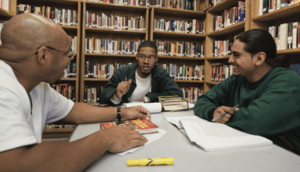 "
"
UPDATED: Nov. 22 at 3:45 p.m.
A clarification is appended below.
The Moreau College Initiative — a collaboration between the University of Notre Dame, Holy Cross College and the Bard Prison Initiative (BPI) — offers certain inmates at Westville Correctional Facility the opportunity to earn an Associate of Arts degree from Holy Cross College. The prison is located in South Bend and is a 45-minute drive from Notre Dame’s campus.
Steve Fallon, professor of humanities at Notre Dame, teaches a lyric poetry class at Westville Correctional Facility through the program.
“I always love teaching at Notre Dame and I love my undergraduate students,” he said. But Fallon is especially enthusiastic about his Westville class. “Whenever my classes were shortened or cancelled, I felt deep disappointment because I’m so energized.”
Inmates at Westville are provided the same rigorous education Notre Dame students receive on campus.
Fallon tells newly-recruited professors, “Teach the course you teach here on campus, teach the same level of difficulty, and [grade] the same way,”
Phillip Sloan, a professor in the Program of Liberal Studies has taught at Westville since 2013 and is involved in developing the science component of the curriculum. He currently teaches a course called “Mathematical Cosmos” at Westville. The academic foundation that the initiative provides prepares the students for future employment, Sloan said.
“I think the kind of training we give people would certainly enable them to get into positions where they could be involved with writing skills, public speaking and educational reform and so forth.”
Sloan believes that the Moreau College Initiative embodies what the American criminal justice system should be.
“What’s the purpose of incarceration? Is it a punishment, or is it reform?” he said. “If you believe in actual reform of the individuals, making them productive individuals when they come out of the system, that’s what this program is involved in. And I think I believe very deeply that this should be the purpose of our prison system.”
Scott Jackson, one of Fallon’s colleagues, visited his Shakespeare class at the prison and said, “It is the best functioning, just community I’ve ever seen.” Students at the Westville Correctional Facility take on the dual identity of student and prisoner. According to Fallon, this only makes them more eager to learn.
“It’s an experience which my colleagues and I find rejuvenating. We’re dealing with a population that’s unlike typical undergraduates who are expected to be in college.” Instead, they work with students who in most cases are “never expected to be in college, especially this kind of college. They’re extraordinarily thirsty and eager and grateful. I’ll teach a three-hour seminar and no one’s attention wanders.”
Students at Westville are intellectually curious and active and they form a collaborative learning community, Fallon said.
“I taught Shakespeare last year and when they were acting in class, they were incredibly mutually supportive of each other,” Fallon recalled, emphasizing how impressive this atmosphere is, as prison is a place where emotions need to be carefully guarded.
“They’re very open with each other,” Fallon said, explaining that the formation of a mutually-supportive learning environment undeniably perpetuates students’ intellectual and mental growths at Westville.
On the first day of classes, Sloan interviewed each of his students, wanting to understand how much educational preparation they had coming into the classroom. He often asked what students did for work prior to prison. “One young man told me, ‘I sold drugs and robbed people,” Sloan said.
The response spoke to the harsh reality many of the men in the Initiative face, and Sloan said it was difficult for that student to move forward.
“This was the way he began the course, with that kind of attitude. But about halfway through the semester, he really seemed to come alive and participate in the discussions. Then I met him again at graduation last May. He was getting his two-year degree,” Sloan said.
“College Behind Bars,” a film, which will be released by Lynn Novick in Nov. 2019, is a four-part PBS documentary series that follows a group of prisoners as they work to get an education through BPI, an intensive prison education program similar to the Moreau College Initiative. According to a preview of the film, in the 20 years since BPI was founded, more than 500 alumni have been released and fewer than 4% have gone back to prison.
An inmate in the preview explained how important BPI was to him. “A friend of mine forced me into the program. It was probably the kindest, most loving thing a person has done for me,” he said.
Another inmate talked about how BPI instilled him with value: “Just because we’re in prison, we’re not animals. What defines us is our minds and our hearts.”
Notre Dame professors believe the Moreau College Initiative fits with the university’s mission.
“We think that it’s very important for all universities, particularly for a university like Notre Dame, which has a strong emphasis on social justice, to share our intellectual resources with underserved communities,” Fallon said. “We feel we have a responsibility to share the resources with those who have been marginalized in society.”
Clearing the Record: An earlier version of this story misattributed a quote about a program that allows prisoners to take college classes to Scott Jackson. The quote should have been attributed to F. Clark Power. Scholastic regrets the error.